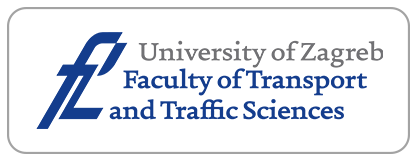Modelling Distribution Routes in City Logistics by Applying Operations Research Methods

Downloads
The article focuses on the up-to-date subject from the practical as well as scientific point of view. It specifically discusses a proposal of an approach concerning transport or distribution problems in the range of city logistics and investigates possibilities to use opted operations research methods in this particular area. Specific suggestions lie first and foremost in using selected tools of operations research (i.e. a set of methods concerning vehicle routing problem) to model multiple variants of distribution paths from a determined hub to multiple spokes in order to minimise the overall travelled distance in an urban area. As far as the very research goes, to define distribution paths to supply multiple logistics objects in the range of city logistics, ensuing methods are step by step used: Clarke-Wright algorithm, Mayer algorithm and the nearest neighbour algorithm. The article consists of a conceptual section, describing the relevant theory as well as data and methods used, the practical part and the section encompassing an assessment of the key findings, along with the discussion. A suitable combination of adequate operations research methods and their application to city logistics issues is where an innovative solution of this research lies.
Downloads
Dhonde BN, Patel CR. Estimating urban freight trips using light commercial vehicles in the Indian textile industry. Transportation Research Interdisciplinary Perspectives. 2021;11: Art. no. 100411. doi: 10.1016/j.trip.2021.100411.
European Standards. EN 14892:2005. Transport service - City logistics - Guideline for the definition of limited access to city centers. 2006. Available from: https://infostore.saiglobal.com/en-gb/Standards/EN-14892-2005-325905_SAIG_CEN_CEN_751122/ [Accessed 24 July 2021].
Cattaruzza D, et al. Vehicle routing problems for city logistics. EURO Journal on Transportation and Logistics. 2017;6(1): 51-79. doi: 10.1007/s13676-014-0074-0.
Taniguchi E, van der Heijden RECM. An evaluation methodology for city logistics. Transport Reviews. 2010;20(1): 65-90. doi: 10.1080/014416400295347.
Zäpfel G, Wasner M. Planning and optimization of hub-and-spoke transportation networks of cooperative third-party logistics providers. International Journal of Production Economics. 2002;78(2): 207-220. doi: 10.1016/S0925-5273(00)00152-3.
Crainic TG, Ricciardi N, Storchi G. Models for evaluating and planning city logistics systems. Transportation Science. 2009;43(4): 407-548. doi: 10.1287/trsc.1090.0279.
Ruesch M, et al. Sustainable goods supply and transport in conurbations: Freight strategies and guidelines. Procedia - Social and Behavioral Sciences. 2012;39: 116-133. doi: 10.1016/j.sbspro.2012.03.095.
Allen J, et al. The role of urban consolidation centres in sustainable freight transport. Transport Reviews. 2012;32(4): 473-490. doi: 10.1080/01441647.2012.688074.
Browne M, et al. Urban freight consolidation centres: Final report. Transport Studies Group, University of Westminster, UK; 2005. Available from: https://ukerc.rl.ac.uk/pdf/RR3_Urban_Freight_Consolidation_Centre_Report.pdf [Accessed 25 July 2021].
Van Duin JHR, Quak H, Muñuzuri J. New challenges for urban consolidation centres: A case study in The Hague. Procedia - Social and Behavioral Sciences. 2010;2(3): 6177-6188. doi: 10.1016/j.sbspro.2010.04.029.
Lindholm M, Behrends S. Challenges in urban freight transport planning – A review in the Baltic Sea Region. Journal of Transport Geography. 2012;22: 129-136. doi: 10.1016/j.jtrangeo.2012.01.001.
Fu J, Jenelius E. Transport efficiency of off-peak urban goods deliveries: A Stockholm pilot study. Case Studies on Transport Policy. 2018;6(1): 156-166. doi: 10.1016/j.cstp.2018.01.001.
Oppenheim N. Urban travel demand modeling: From individual choices to general equilibrium. Wiley; 1995. 480 p.
Sheffi Y. Urban transportation networks: Equilibrium analysis with mathematical programming methods. Prentice Hall; 1985. 416 p.
Bu L, et al. Selection of city distribution locations in urbanized areas. Procedia - Social and Behavioral Sciences. 2012;39: 556-567. doi: 10.1016/j.sbspro.2012.03.130.
Sopha BM, et al. Urban distribution center location: Combination of spatial analysis and multi-objective mixed-integer linear programming. International Journal of Engineering Business Management. 2016;8: 1-10. doi: 10.1177/1847979016678371.
Cui G, Li Y. Study on the location of distribution center: A genetic algorithm combining mechanism of simulated annealing. International conference on machine learning and cybernetics, 26-29 August 2004, Shanghai, China. 2004. p. 2601-2606.
Zheng Z, Zheng Z. A logistics distribution center location method based on improved genetic algorithm. 2nd International Conference on Education Technology and Computer (ICETC), 22–24 June 2010, Shanghai, China. 2010. p. 123-126.
Gonzalez-Feliu J. Models and methods for the city logistics: The two-echelon capacitated vehicle routing problem. PhD thesis. Politecnico di Torino, Italy; 2008.
Gonzalez-Feliu J. Vehicle routing in multi-echelon distribution systems with cross-docking: A systematic lexical-metanarrative analysis. Computer and Information Science. 2013;6(3): 28-47. doi: 10.5539/cis.v6n3p28.
Dablanc L. City distribution, a key element of the urban economy: Guidelines for practitioners. In: City distribution and urban freight transport: Multiple perspectives. Northampton, UK: Edward Elgar Publishing; 2011. p. 13-36.
Masson R, et al. Optimization of a city logistics transportation system with mixed passengers and goods. EURO Journal on Transportation and Logistics. 2017;6(1): 81-109. doi: 10.1007/s13676-015-0085-5.
Lewczuk K, et al. Vehicle routing in an urban area: Environmental and technological determinants. WIT Transactions on The Built Environment. 2013;130: 373-384. doi: 10.2495/UT130291.
Van Heeswijk WJA, et al. The delivery dispatching problem with time windows for urban consolidation centers. Transportation Science. 2019;53(1): 203-221. doi: 10.1287/trsc.2017.0773.
Kruskal JB Jr. On the shortest spanning subtree of a graph and the traveling salesman problem. Proceedings of the American Mathematical Society. 1957;7: 48-50.
Holoubek J. Ekonomicko-matematické metody. Brno, Czech Republic: Mendel University of Agriculture and Forestry; 2006. (in Czech).
Yang J, et al. An ant colony optimization method for generalized TSP problem. Progress in Natural Science. 2008;18(11): 1417-1422.
Šedivý J, et al. Possible application of solver optimization module for solving single-circuit transport problems. LOGI – Scientific Journal on Transport and Logistics. 2020;11(1): 78-87. doi: 10.2478/logi-2020-0008.
Moreno J, et al. An exact and heuristic approach for the d-minimum branch vertices problem. Computational Optimization and Applications. 2018;71(3): 829-855. doi: 10.1007/s10589-018-0027-x.
Fedorko G, et al. Application of simulation model in terms of city logistics. 20th International Scientific on Conference Transport Means 2016, 5-7 October 2016, Juodkrante, Lituania. 2016. p. 169-174.
Chovancová M, Klapita V. Modeling the supply process using the application of selected methods of operational analysis. Open Engineering. 2017;7(1): 50-54. doi: 10.1515/eng-2017-0009.
Caban J, Voltr O. A Study on the use of eco-driving technique in city traffic. The Archives of Automotive Engineering – Archiwum Motoryzacji. 2020;93(3): 15-25. doi: 10.14669/AM.VOL93.ART2.
Bin Othman MS, Shurbevski A, Karuno Y, Nagamochi H. Routing of carrier-vehicle systems with dedicated last-stretch delivery vehicle and fixed carrier route. Journal of Information Processing. 2017;25: 655-666. doi: 10.2197/ipsjjip.25.655.
Liu L, Liao W. Optimization and profit distribution in a two-echelon collaborative waste collection routing problem from economic and environmental perspective. Waste Management. 2021;120: 400-414. doi: 10.1016/j.wasman.2020.09.045.
Keçeci B, Altiparmak F, Kara I. Heterogeneous vehicle routing problem with simultaneous pickup and delivery: Mathematical formulations and a heuristic algorithm. Journal of the Faculty of Engineering and Architecture of Gazi University. 2015;30(2): 185-195.
Clarke G, Wright JW. Scheduling of vehicles from a central depot to a number of delivery points. Operations Research. 1964;12(4): 568-581. doi: 10.1287/opre.12.4.568.
Stevens BH. Location theory and programming models: The von Thünen case. Papers of the Regional Science Association. 1968;21(1): 19-34. doi: 10.1007/BF01952719.
Caban J, Kravchenko K. chosen aspects of packages in the distribution of selected dairy products. LOGI – Scientific Journal on Transport and Logistics. 2018;9(2): 1-9. doi: 10.2478/logi-2018-0013.
Kučera P, Krejčí I. Contribution of simple heuristics for the vehicle routing problem - A case study of a small brewery. Acta Universitatis Agriculturae Et Silviculturae Mendelianae Brunensis. 2013;61(7): 2393-2401. doi: 10.11118/actaun201361072393.
Shahmoradi-Moghadam H, Schönberger J. Coordinated allocation production routing problem for mobile supply chains with shared factories. Computers and Chemical Engineering. 2021;155(2): Art. no. 107501. doi: 10.1016/j.compchemeng.2021.107501.
Vidal T, et al. Time-window relaxations in vehicle routing heuristics. Journal of Heuristics. 2015;21(3): 329-358. doi: 10.1007/s10732-014-9273-y.
Janjevic M, Merchán D, Winkenbach M. Designing multi-tier, multi-service-level, and multi-modal last-mile distribution networks for omni-channel operations. European Journal of Operational Research. 2021;294: 1059-1077. doi: 10.1016/j.ejor.2020.08.043.
Xia C, et al. A novel discrete differential evolution algorithm for the vehicle routing problem in B2C e-commerce. International Journal of Bifurcation and Chaos. 2015;25(14): Art. no. 1540033. doi: 10.1142/S0218127415400337.
Lombardi GV, et al. Assessing efficiency of urban waste services and the role of tariff in a circular economy perspective: An empirical application for Italian municipalities. Journal of Cleaner Production. 2021;323: Art. no. 129097. doi: 10.1016/j.jclepro.2021.129097.
Agafonov AA, Yumaganov AS, Myasnikov VV. Big data analysis in a geoinformatic problem of short-term traffic flow forecasting based on a K nearest neighbors method. Computer Optics. 2018;42(6): 1101-1111. doi: 10.18287/2412-6179-2018-42-6-1101-1111.
Droździel P, et al. Optimization of the position of the local distribution centre of the regional post logistics network. Transport Problems. 2017;12(3): 43-50. doi: 10.20858/tp.2017.12.3.4.
Cheng D. Hamiltonian paths and cycles pass through prescribed edges in the balanced hypercubes. Discrete Applied Mathematics. 2019;262: 56-71. doi: 10.1016/j.dam.2019.02.033.
EUR-Lex. Regulation (EC) No 561/2006 of the European Parliament and of the Council of 15 March 2006 on the harmonisation of certain social legislation relating to road transport. 2006. Available from: https://eur-lex.europa.eu/legal-content/EN/ALL/?uri=CELEX%3A32006R0561 [Accessed 20 August 2021].
Strohmandl J, Cempírek, M. Experimental measurements used to reduce emergency situations of environmental continuous transport. 20th International Scientific on Conference Transport Means 2016, 5-7 October 2016, Juodkrante, Lituania. 2016. p. 835-839.
Jaskiewicz M, et al. Facility for performance testing of power transmission units. Scientific Journals of the Maritime University of Szczecin-Zeszyty Naukowe Akademii Morskiej w Szczecinie. 2015;42(114): 14-25.
Copyright (c) 2022 Ondrej Stopka

This work is licensed under a Creative Commons Attribution-NonCommercial-NoDerivatives 4.0 International License.




















